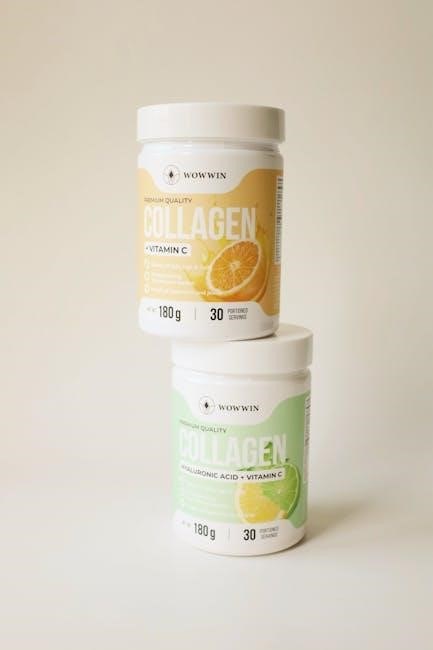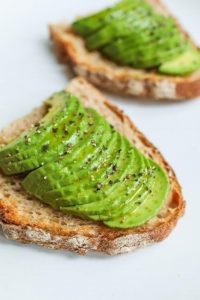
An acid reflux diet focuses on managing symptoms of GERD by avoiding trigger foods and incorporating beneficial ones. It emphasizes lifestyle changes and personalized approaches to alleviate heartburn and discomfort effectively.
Understanding Acid Reflux and GERD
Gastroesophageal reflux disease (GERD) is a chronic condition where stomach acid flows back into the esophagus‚ causing discomfort. Acid reflux occurs when the lower esophageal sphincter (LES) relaxes improperly‚ allowing acid to rise. Symptoms include heartburn‚ chest pain‚ and difficulty swallowing. Overweight‚ obesity‚ and certain foods can weaken the LES‚ delaying stomach emptying and worsening symptoms. While occasional acid reflux is common‚ GERD is diagnosed when symptoms occur frequently‚ disrupting daily life. Managing GERD often involves lifestyle changes and dietary adjustments to reduce acid production and alleviate irritation. Understanding the triggers and mechanisms of acid reflux is key to developing an effective management plan.
The Role of Diet in Managing Acid Reflux
Diet plays a crucial role in managing acid reflux‚ as certain foods can trigger or alleviate symptoms. A well-structured diet helps reduce stomach acid production and prevents irritation of the esophagus. By avoiding fatty‚ spicy‚ and acidic foods‚ individuals can minimize episodes of heartburn. Incorporating low-fat‚ high-fiber foods‚ non-citrus fruits‚ and lean proteins supports digestive health and reduces reflux risk. Additionally‚ eating smaller‚ frequent meals prevents overloading the stomach. Personalizing the diet based on individual triggers is essential‚ as responses to foods vary. While no single “GERD diet” exists‚ adopting a Mediterranean or plant-based approach often provides relief. Regular monitoring of symptoms and adjusting dietary habits accordingly ensures long-term management. Thus‚ diet is the first line of therapy for GERD‚ offering a non-invasive and effective way to control symptoms and improve quality of life.

Foods to Avoid in Acid Reflux Diet
Foods to avoid include fatty‚ fried‚ spicy‚ and acidic foods‚ as well as chocolate‚ caffeine‚ and alcohol. These can relax the lower esophageal sphincter‚ delay stomach emptying‚ and trigger reflux. Eliminating them helps manage symptoms effectively.
Fatty and Fried Foods
Fatty and fried foods are major triggers for acid reflux. They relax the lower esophageal sphincter and slow stomach emptying‚ increasing reflux risk. These foods are high in fat‚ delaying digestion and putting pressure on the sphincter. Examples include fried meats‚ processed snacks‚ and heavy sauces. Avoiding these can significantly reduce heartburn and discomfort. Opting for baked‚ grilled‚ or steamed alternatives helps manage symptoms. Lean proteins and low-fat options are better choices; Reducing fat intake eases digestive strain and supports overall health. Identifying and eliminating these foods from your diet is crucial for controlling GERD effectively.
Spicy and Acidic Foods
Spicy and acidic foods are common triggers for acid reflux. They can irritate the esophagus and lower esophageal sphincter‚ leading to heartburn and discomfort. Citrus fruits‚ tomatoes‚ vinegar‚ and hot spices like chili peppers are particularly problematic. These foods increase stomach acid production and can weaken the sphincter’s function. Avoiding them helps reduce symptom frequency. Opting for non-citrus fruits like bananas‚ apples‚ and berries is a better choice. Mild herbs and spices can add flavor without causing reflux. Identifying personal triggers and adjusting dietary habits accordingly is essential for managing GERD effectively. Balancing meals with alkaline-rich foods may also help neutralize acidity and alleviate symptoms;
Chocolate‚ Caffeine‚ and Alcohol
Chocolate‚ caffeine‚ and alcohol are common triggers for acid reflux and should be limited or avoided in a GERD-friendly diet. Chocolate contains substances like theobromine and caffeine‚ which can relax the lower esophageal sphincter (LES)‚ allowing stomach acid to flow back into the esophagus. Caffeinated beverages‚ such as coffee‚ tea‚ and energy drinks‚ can also weaken the LES and increase acid production‚ exacerbating symptoms. Alcohol‚ particularly in large amounts‚ can irritate the esophagus and worsen reflux. It also relaxes the LES and slows digestion‚ prolonging the time acid stays in the stomach. To manage symptoms‚ consider replacing these items with non-caffeinated herbal teas or decaf coffee. Moderation is key if complete avoidance is challenging. Tracking individual responses to these substances can help tailor a personalized diet plan for optimal relief from GERD symptoms.
Foods to Include in Acid Reflux Diet
Incorporate non-citrus fruits‚ vegetables‚ lean proteins‚ and whole grains into your diet. Oatmeal‚ bananas‚ and ginger are excellent choices‚ as they help alleviate symptoms and promote digestion. These foods are gentle on the stomach and can reduce acid reflux discomfort effectively.
Low-Fat and High-Fiber Foods
Low-fat and high-fiber foods are essential in an acid reflux diet as they help reduce symptoms and promote better digestion. These foods are less likely to trigger acid production or relax the lower esophageal sphincter. Incorporating whole grains like oats‚ barley‚ and brown rice can provide sustained fiber intake. Vegetables such as broccoli‚ carrots‚ and green beans are also excellent choices due to their high fiber and low acidity. Lean proteins like poultry‚ fish‚ and legumes are beneficial as they are easier to digest compared to fatty meats. High-fiber foods also help prevent overeating by keeping you feeling fuller longer‚ which can reduce pressure on the stomach. Avoid fried or high-fat versions of these foods‚ as they can exacerbate reflux. Opting for baked‚ grilled‚ or steamed preparations ensures you gain the benefits without triggering discomfort. Including these foods regularly can significantly improve your ability to manage acid reflux symptoms effectively.
Non-Citrus Fruits and Vegetables
Non-citrus fruits and vegetables are highly recommended in an acid reflux diet due to their low acidity and ease of digestion. Fruits like bananas‚ apples‚ pears‚ and melons are ideal choices as they are gentle on the stomach and less likely to trigger heartburn. Vegetables such as spinach‚ cucumbers‚ and bell peppers are also beneficial‚ as they are alkaline and help neutralize stomach acid. Incorporating these foods into meals can help balance the digestive system and reduce inflammation. It’s important to avoid citrus fruits like oranges and grapefruits‚ as well as tomatoes and tomato-based products‚ which are high in acidity. Steaming or baking vegetables without added fats or spices can further enhance their digestive benefits. By focusing on non-citrus options‚ individuals can enjoy a variety of flavors while maintaining control over their acid reflux symptoms. This approach supports a balanced and sustainable diet tailored to alleviate discomfort and promote overall well-being.
Lean Proteins and Whole Grains
Lean proteins and whole grains are essential components of an acid reflux diet‚ offering both nutritional value and digestive benefits. Protein sources like poultry‚ fish‚ and egg whites are ideal because they are low in fat and less likely to trigger heartburn. Plant-based options such as beans and legumes are also excellent choices‚ as they are rich in fiber and protein. Whole grains‚ including oatmeal‚ quinoa‚ and brown rice‚ are high in fiber‚ which helps regulate digestion and reduce symptoms. These foods are also low in acidity and easy to digest‚ making them a great alternative to fatty or processed options. Incorporating lean proteins and whole grains into meals can help maintain a balanced diet while minimizing acid reflux discomfort. By focusing on these foods‚ individuals can enjoy satisfying meals without compromising their digestive health. This approach supports long-term symptom management and overall well-being.
Lifestyle Modifications for Acid Reflux
Lifestyle changes play a crucial role in managing acid reflux symptoms. Adjustments like eating smaller meals‚ maintaining a healthy weight‚ and avoiding late-night eating can significantly reduce discomfort and improve digestion.
Eating Habits: Smaller‚ More Frequent Meals
Eating smaller‚ more frequent meals helps manage acid reflux by reducing stomach pressure and preventing excessive acid production. This approach minimizes the risk of food refluxing into the esophagus. Opting for 4-6 smaller meals instead of 3 large ones can alleviate symptoms. Additionally‚ avoiding overeating or continuous snacking is crucial‚ as it can overwhelm the digestive system. Eating slowly and mindfully also aids digestion‚ reducing discomfort. Pairing these habits with a low-fat‚ high-fiber diet further enhances benefits. By adopting these eating patterns‚ individuals can effectively control acid reflux and improve overall gastrointestinal health.
Weight Management and Exercise
Maintaining a healthy weight is crucial for managing acid reflux‚ as excess body fat can pressure the stomach‚ causing acid to rise into the esophagus. Engaging in regular‚ moderate-intensity exercise‚ such as walking or swimming‚ helps with weight management and improves digestion. However‚ timing is essential; avoid vigorous workouts immediately after meals‚ as this can worsen symptoms. Additionally‚ strength training can strengthen the lower esophageal sphincter‚ offering further relief. Combining a balanced diet with consistent physical activity not only reduces acid reflux episodes but also enhances overall well-being. It’s important to tailor exercise routines to individual comfort levels and consult a healthcare provider for personalized advice.
Meal Planning and Recipes
Plan balanced meals with lean proteins‚ non-acidic vegetables‚ and whole grains to reduce reflux symptoms. Opt for smaller‚ frequent meals and avoid trigger foods like citrus or fats.
Breakfast Options: Oatmeal and Bananas
Oatmeal is a low-fat‚ high-fiber breakfast option that soothes the stomach and reduces acid reflux symptoms. Top it with sliced bananas‚ which naturally combat stomach acid. This combination provides a gentle start to the day‚ aiding digestion and preventing heartburn. Incorporating such meals helps manage GERD effectively without discomfort.
Lunch and Dinner Ideas: Grilled Meats and Steamed Vegetables
Grilled meats like chicken‚ turkey‚ or fish are excellent choices for lunch and dinner‚ as they are lean and low in fat‚ reducing the risk of triggering acid reflux. Opt for skinless options to minimize fat intake. Pair these with steamed vegetables such as green beans‚ carrots‚ or zucchini‚ which are non-acidic and gentle on the stomach. Avoid heavy sauces or seasonings that may irritate the esophagus.
Steam cooking helps retain the nutrients in vegetables while keeping them soft and easy to digest. This combination provides a balanced meal that is less likely to cause heartburn or discomfort. Incorporating these ideas into your diet can help manage acid reflux symptoms effectively and promote overall digestive health.

Natural Remedies and Supplements
Ginger‚ alkaline water‚ and probiotics are natural remedies that may help alleviate acid reflux symptoms. Herbal teas like chamomile can also support digestion and reduce discomfort. These options can complement dietary changes.
Ginger and Alkaline Water
Ginger is a natural anti-inflammatory that can help soothe the esophagus and reduce acid reflux symptoms. It can be consumed as tea‚ added to meals‚ or taken in supplement form. Alkaline water‚ with a higher pH level‚ may help neutralize stomach acid and provide quick relief. Some studies suggest that ginger’s properties can alleviate heartburn and improve digestion. However‚ results may vary‚ and these remedies should be used alongside dietary changes. Incorporating ginger and alkaline water into your routine can be a beneficial complement to a structured acid reflux diet. Always consult a healthcare provider before starting new supplements or remedies to ensure they align with your overall treatment plan.
Probiotics and Herbal Teas
Probiotics are beneficial bacteria that support gut health and may improve digestion‚ potentially reducing acid reflux symptoms. They can be found in fermented foods like yogurt or taken as supplements. Herbal teas‚ such as chamomile‚ peppermint‚ and licorice root tea‚ are natural remedies that may soothe the esophagus and lower esophageal sphincter‚ reducing heartburn. Chamomile tea is known for its calming effects‚ while ginger tea can also help alleviate inflammation. However‚ it’s important to avoid teas that might trigger symptoms‚ such as mint‚ which can relax the lower esophageal sphincter. Incorporating these natural remedies into your diet can complement other lifestyle changes and provide additional relief from acid reflux symptoms. Always choose herbal teas in moderation and consult a healthcare provider if symptoms persist.

Managing Symptoms and Medications
Over-the-counter medications like antacids and H2 blockers can relieve heartburn. Monitor symptoms and adjust treatments as needed. Consult a healthcare provider if symptoms persist despite lifestyle and diet changes.

Over-the-Counter (OTC) Medications
Over-the-counter medications are often the first line of defense against acid reflux symptoms. Antacids‚ such as Tums or Rolaids‚ provide quick relief by neutralizing stomach acid. Histamine-2 (H2) blockers like ranitidine (Zantac) reduce acid production and can be effective for mild to moderate symptoms. Proton pump inhibitors (PPIs)‚ including omeprazole (Prilosec) and lansoprazole (Prevacid)‚ are more potent and can provide longer-lasting relief. These medications are widely available and can be taken as needed or consistently‚ depending on the severity of symptoms. However‚ it’s important to follow the recommended dosage and consult a healthcare provider if symptoms persist or worsen. OTC medications can be a valuable addition to dietary and lifestyle changes‚ helping to manage heartburn and prevent esophageal irritation effectively.
When to Consult a Healthcare Provider
It is crucial to consult a healthcare provider if acid reflux symptoms persist despite dietary and lifestyle changes. Severe or frequent heartburn‚ difficulty swallowing‚ or chest pain may indicate a more serious condition like GERD or esophageal damage. Persistent symptoms can lead to complications such as esophagitis‚ strictures‚ or Barrett’s esophagus‚ which require medical attention. Additionally‚ if over-the-counter medications are ineffective or if symptoms worsen‚ professional guidance is necessary. A healthcare provider may recommend further testing‚ such as an endoscopy‚ to assess the esophagus and stomach. They can also prescribe stronger medications or suggest other treatment options. Early consultation helps prevent long-term damage and ensures effective management of symptoms‚ improving overall quality of life. Consulting a healthcare provider is essential for personalized care and addressing underlying issues effectively.
A well-structured acid reflux diet reduces symptoms‚ improves quality of life‚ and prevents complications. Consistency and monitoring are key to long-term success and optimal digestive health.
Benefits of a Well-Structured Acid Reflux Diet
A well-structured acid reflux diet offers numerous benefits‚ primarily reducing symptoms like heartburn and discomfort. By focusing on non-acidic‚ low-fat‚ and high-fiber foods‚ it supports digestion and prevents esophageal irritation. This dietary approach can improve overall quality of life‚ allowing individuals to enjoy meals without distress. Additionally‚ it may reduce reliance on medications by addressing the root causes of reflux. A personalized diet plan can also promote weight management and improve general health‚ further alleviating GERD symptoms. Consistency in following the diet enhances long-term benefits‚ leading to fewer complications and a healthier lifestyle.
Importance of Consistency and Monitoring
Consistency and monitoring are crucial for effectively managing acid reflux through dietary changes. Adhering to a structured diet helps maintain symptom relief and prevents flare-ups. Regular monitoring allows individuals to identify trigger foods and adjust their diet accordingly. Tracking symptoms and food intake can provide valuable insights‚ enabling tailored adjustments for better control. Over time‚ consistency reinforces healthy eating habits‚ reducing the likelihood of acid reflux episodes. Monitoring also helps in assessing the effectiveness of the diet and identifying the need for further modifications. This proactive approach ensures long-term management of GERD‚ improving overall well-being and reducing the risk of complications. By staying committed and observant‚ individuals can optimize their diet’s impact and achieve sustained relief from acid reflux symptoms.




